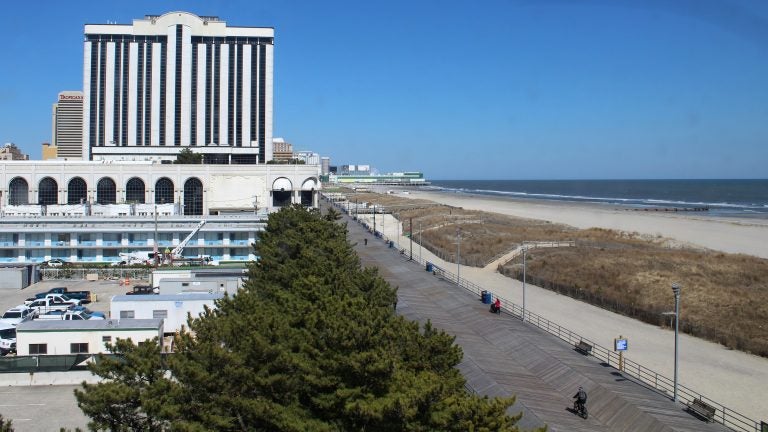Facing a Jersey Shore underwater, Stockton proposes coastal resiliency institute in Atlantic City
Rising sea levels threaten to inundate Jersey Shore communities. Stockton University sees an opportunity as towns build their defenses.

The view from a dorm room on Stockton's Atlantic City campus. (Bill Barlow for WHYY)
The U.S. Army Corps of Engineers estimates that Shore communities in New Jersey will soon face a combined average of $1.6 billion in storm damage every year if no more action is taken to protect the coast from rising sea levels.
And preventing that flooding will require massive investments of public funds.
Recognizing both a threat and an opportunity, Stockton University is hoping to open a coastal resiliency institute at its new campus in Atlantic City.
“In addition to being a significant public policy issue, it is also a growth industry that Atlantic City is well-positioned to be involved in,” James Rutala, a consultant for the university, said at a forum hosted by Stockton earlier this week.
Diane D’Amico, a Stockton spokeswoman, stressed that creation of the institute is not a done deal.
“It has been proposed, but we do not have a definite plan for implementing it at this time,” she said. The New Jersey Economic Development Authority is funding a feasibility study for the project that is expected to be completed next month.
But if the university decides to move ahead, Rutala said a coastal resiliency “incubator” could be set up in existing space on Stockton’s Atlantic City campus as early as this fall while the university looks to construct a new building for a full-fledged institute.
Such an institute wouldn’t be the first of its kind in the state. Rutgers has a climate institute and Stockton already has a coastal research center.
But Rutala suggested Stockton — and Atlantic City — has an opportunity to do more. If the resort town can establish itself as a hub for climate change research and related industries, such as offshore wind, it could capture some of the enormous expenditures that confronting rising sea levels will require, he said.
Rutala pointed to a recent study from the Center for Climate Integrity, an environmental advocacy group, that said communities across the U.S. face $400 billion in costs over the next 20 years for coastal defenses like seawalls.
That includes $25 billion in New Jersey, according to the study.
Offshore wind, meanwhile, will generate an estimated $70 billion in spending in seven East Coast states by 2030, according to researchers at the University of Delaware.
Last month, the state Board of Public Utilities approved New Jersey’s first offshore wind farm 15 miles off the coast of Atlantic City.
Governments and nonprofits have funded research centers in other states similar to the one Stockton is considering. The University of North Carolina at Chapel Hill, for example, launched its Coastal Resilience Center of Excellence in 2015 with the help of a $20 million grant from the Department of Homeland Security.
New Jersey Department of Environmental Protection Commissioner Catherine McCabe, who also spoke at the Stockton forum this week, said the costs of bolstering New Jersey’s coastal protections could be “extraordinary.”
But just how bad coastal flooding becomes, she said, depends on the success of efforts to keep global warming to a minimum.
“I think we are very much looking at a situation in 40 years … where we could be walking around from ankle deep to knee deep,” she said, referring to the potential effects of sea level rise in Atlantic City. “But again, there are a lot of things that we can do.”
For this summer, at least, New Jersey’s beaches are better prepared than they were before Superstorm Sandy to handle a similar storm, said Stewart Farrell, director of the Stockton University Coastal Research Center.
That’s thanks to extensive beach widening, dune building and other storm risk mitigation projects up and down the shore, he said.
McCabe said the Shore is in excellent shape for the holiday weekend.
“The beaches are wide, the beaches are fully replenished, the beaches are clean, the water quality is good, and it should be a great Fourth of July time for everyone,” she said.
WHYY is your source for fact-based, in-depth journalism and information. As a nonprofit organization, we rely on financial support from readers like you. Please give today.





